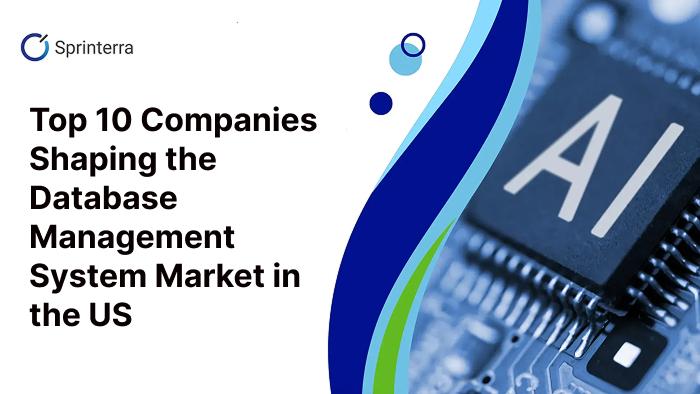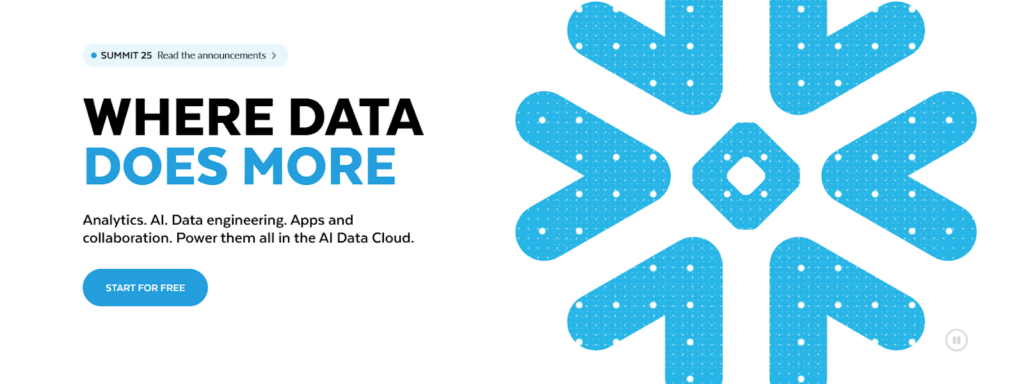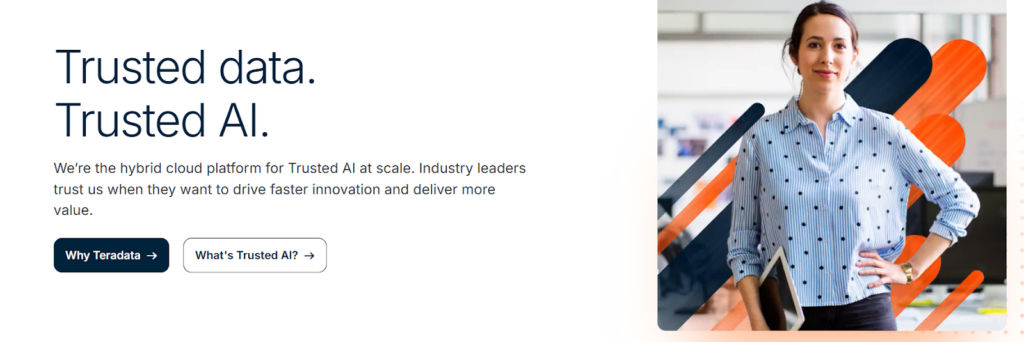
In today’s data-driven world, organizations across industries are increasingly reliant on powerful database systems to manage the ever-growing volume, velocity, and variety of data. The U.S. database management system (DBMS) market is rapidly expanding, fueled by the proliferation of cloud computing, the explosion of big data, and the critical need for real-time analytics.
Choosing the right DBMS provider isn’t just a technical choice, it’s a strategic one that impacts scalability, compliance, and data accessibility. In this blog, we highlight 10 companies leading the U.S. DBMS market, recognized for their innovation, market presence, and transformative solutions.
Data management is how we collect, store, organize, protect, and use data.
Think of it like running a super-efficient kitchen:
Done right, data management gives businesses clean, trustworthy data and keeps regulators off their backs.
Not all data is created equal, and neither are the ways we manage it. Depending on your needs, you might need one or several of these services:
Protects you from disaster, whether it’s a cyberattack, accidental deletion, or hardware failure.
Includes:
Ideal for remote teams and scalable growth. Enables:
For companies dealing with massive data sets in real-time. Supports:
Ensure your business plays by the rules.
Covers:
These services can be mixed and matched depending on the size, type, and goals of your business.
Definition and Core Functions A DBMS is a software system that enables users to store, retrieve, and manage data efficiently and securely. These systems handle structured, semi-structured, and unstructured data types.
Types of DBMS – Relational (RDBMS) – NoSQL – NewSQL – Cloud-native DBMS – In-memory DBMS
Use Cases Across Industries DBMS platforms are vital in finance (fraud detection), healthcare (EMR systems), retail (inventory and customer data), and manufacturing (supply chain optimization), among many others.
Data is the lifeblood of the digital world. Every click, purchase, medical record, and Netflix recommendation is a tiny breadcrumb of data floating through cyberspace. But raw data by itself? It’s chaos.
Without proper management, businesses are drowning in information but starving for insight, kind of like owning a treasure chest but losing the key.
That’s where data management companies step in. They don’t just help you “store stuff.” They clean, sort, secure, and optimize your data by transforming it from a messy digital jungle into a powerhouse of business insight.
In this blog, we’ll break down:
Your data shapes your digital life.
Data drives everything from product design to customer experience.
Bottom line? Data is power, but only when it’s properly managed.
Everything we just talked about. A good data management company handles it for you.
Here’s what they typically offer:
Think of them as your data’s personal trainer, security guard, and librarian rolled into one.
Choosing a data partner is a big decision, you need a provider that’s reliable, secure, and aligned with your long-term goals.
Here’s what to look for:
Security & Compliance
Look for encryption, access control, and adherence to major regulations (GDPR, HIPAA, CCPA). If they can’t keep your data safe, they’re not worth it.
Scalability
Your data needs will grow. Your provider should grow with you.
Integration
Make sure their tools play nicely with your existing systems (CRMs, ERPs, BI tools, etc.). Otherwise, you’ll spend half your time copying and pasting.
Cost vs. Value
Cheaper isn’t always better. Look for transparent pricing, clear ROI, and support when things go sideways.
Company size: 150 employees
Founding year: 2014
Website: https://www.sprinterra.com/
Headquarters: New York, New York, USA
Overview:
Sprinterra is a U.S.-based software development firm rapidly gaining recognition for its tailored Database Management System (DBMS) consulting and custom data solutions. Specializing in healthcare, fintech, and enterprise-scale environments, Sprinterra helps organizations build scalable, secure, and high-performance data infrastructure.
The company excels at integrating both open-source platforms (such as PostgreSQL and MariaDB) and proprietary systems, creating hybrid solutions that align with each client’s specific needs. Its end-to-end services include modernization, migration, and full-scale data engineering, enabling seamless transitions from legacy systems to cloud-ready environments.
Sprinterra’s core capabilities include:
Sprinterra also helps organizations improve data literacy by standardizing definitions and aligning metrics. This bridges the gap between day-to-day operations and strategic goals. With 90 percent of executives identifying data fluency as essential, yet only 25 percent of employees trusting their data, Sprinterra addresses this gap through formal data governance frameworks, including glossary-driven MDM, EDW, and CDP components.
By combining hands-on technical execution with strategic oversight, Sprinterra delivers solutions that manage data effectively and unlock its full potential for analytics, operational efficiency, and long-term growth.

Company size: 10,000+ employees
Founding year: 2006
Website: https://aws.amazon.com/
Headquarters: Seattle, Washington, USA
Overview:
Amazon Web Services (AWS) is the world’s most comprehensive and widely adopted cloud platform, known for revolutionizing the way organizations manage their IT infrastructure. Among its robust suite of services, AWS provides highly scalable and secure database solutions that cater to virtually every use case and industry.
Its flagship offerings include Amazon RDS (a managed relational database service), Amazon DynamoDB (a NoSQL database for key-value and document data), and Amazon Aurora (a high-performance relational database built for the cloud). These services are engineered for availability, durability, and seamless scaling, enabling businesses to support mission-critical workloads with confidence.
AWS databases are tightly integrated with the broader AWS ecosystem, including tools for analytics, machine learning, and security. This makes it ideal for enterprises looking to build intelligent applications with minimal operational overhead. Features like automated backups, high availability, encryption, and advanced monitoring make AWS a trusted platform for financial institutions, healthcare providers, and global tech companies alike.
With customers ranging from startups to Fortune 500 companies, AWS continues to set the standard for innovation, scalability, and operational excellence in the cloud computing and data management space.
Company size: 200,000+ employees
Founding year: 1975
Website: https://www.microsoft.com/
Headquarters: Redmond, Washington, USA
Overview:
Microsoft Corporation is a global technology leader with a strong legacy in enterprise software, cloud computing, and data management. Its database offers span on-premises and cloud environments, providing flexible solutions for businesses of all sizes.
Key products include Microsoft SQL Server trusted on-premise and hybrid relational database and Azure SQL Database, a fully managed cloud-based relational DBMS. Both platforms offer robust performance, advanced security, and seamless integration with other Microsoft tools like Power BI, Excel, Azure AI, and Azure Synapse Analytics.
One of Microsoft’s core strengths lies in its deep integration across the Microsoft ecosystem. Users benefit from unified experience in data collection, analysis, visualization, and automation. High availability, built-in disaster recovery, advanced performance tuning, and encryption make Microsoft a go-to choice for government agencies, financial institutions, and large enterprises.
Its commitment to innovation is reflected in features like Hyperscale architecture, AI-powered performance optimization, and real-time analytics. Microsoft continues to evolve its data platform to support modern business needs, including hybrid and multi-cloud environments, making it a cornerstone for digital transformation initiatives worldwide.
Company size: 140,000+ employees
Founding year: 1977
Website: https://www.oracle.com/
Headquarters: Austin, Texas, USA
Overview:
Oracle Corporation is a pioneer and global leader in enterprise-grade database systems and cloud infrastructure. Known for powering critical systems across banking, telecommunications, and manufacturing, Oracle’s data solutions are built for scale, security, and performance.
The company’s flagship product, Oracle Database, remains one of the most widely used relational database systems globally. Its evolution into the Oracle Autonomous Database has marked a significant leap in database innovation introducing self-managing, self-securing, and self-repairing capabilities powered by machine learning and artificial intelligence.
Oracle’s database platforms support both Online Transaction Processing (OLTP) and Online Analytical Processing (OLAP) workloads, offering unparalleled performance for real-time decision-making and high-throughput applications. Integration with Oracle Cloud Infrastructure (OCI) provides enhanced elasticity, scalability, and security.
Key strengths include multi-model data support, autonomous operations, advanced analytics, and strong compliance with global data privacy standards. Oracle’s continued investment in AI, blockchain, and big data ensures its solutions remain future-ready.
With a deep focus on enterprise performance, security, and automation, Oracle remains the platform of choice for organizations looking to modernize legacy infrastructure, reduce operational costs, and accelerate digital transformation across mission-critical environments.

Company size: 250,000+ employees
Founding year: 1911
Website: https://www.ibm.com/
Headquarters: Armonk, New York, USA
Overview:
IBM Corporation is a global technology powerhouse known for delivering secure, scalable, and AI-enhanced data management solutions. With a long history of innovation in enterprise IT, IBM offers a robust database portfolio tailored for businesses operating in compliance-heavy sectors like healthcare, finance, and government.
Its flagship products include IBM Db2, a high-performance relational database platform, and IBM Cloud Pak for Data, an integrated data and AI platform that supports hybrid and multi-cloud deployments. These tools offer advanced data governance, encryption, and real-time analytics powered by IBM’s Watson AI capabilities.
IBM’s solutions are trusted by enterprises worldwide for their ability to streamline data pipelines, improve operational efficiency, and ensure regulatory compliance. With built-in support for AI-driven performance optimization, data virtualization, and metadata management, IBM empowers organizations to unlock insights from complex and diverse datasets.
IBM’s commitment to hybrid cloud strategies allows seamless data integration across on-premise and cloud environments, ensuring flexibility for enterprises undergoing digital transformation. Its deep focus on data security, governance, and trusted AI makes it a top choice for organizations seeking resilient and intelligent data infrastructures.
Company size: 150,000+ employees (under Alphabet Inc.)
Founding year: 2008
Website: https://cloud.google.com/
Headquarters: Mountain View, California, USA
Overview:
Google Cloud Platform (GCP) is a cutting-edge cloud services provider known for its powerful data infrastructure, distributed systems, and machine learning integration. GCP delivers highly scalable, developer-friendly data solutions that serve both startups and large-scale enterprises across the globe.
Key offerings include Cloud SQL (a managed relational database service supporting MySQL and PostgreSQL) and Cloud Spanner, a globally distributed, horizontally scalable relational database with strong consistency. These products are engineered for real-time analytics, high availability, and seamless scaling.
GCP’s standout feature is its tight integration with Google’s AI and machine learning tools, including TensorFlow and Vertex AI, as well as its analytics platform, BigQuery. This enables businesses to build intelligent, data-driven applications with minimal friction.
Ideal for agile teams and innovative platforms, GCP’s data services are used extensively by SaaS companies, gaming platforms, and e-commerce businesses. Its infrastructure supports multi-cloud and hybrid deployments, along with robust security and compliance frameworks.
Google Cloud’s commitment to open-source compatibility and modern architectures like Kubernetes, serverless computing, and microservices makes it a preferred choice for organizations building modern, cloud-native applications with real-time data needs.
Company size: 5,000+ employees
Founding year: 2007
Website: https://www.mongodb.com/
Headquarters: New York, New York, USA
Overview:
MongoDB, Inc. is a leading force in the NoSQL database market, recognized for its developer-friendly, document-based data model that excels at handling unstructured and semi-structured data. Designed to offer flexibility, speed, and scalability, MongoDB has become a go-to platform for agile development and modern application architectures.
Its flagship product, MongoDB Atlas, is a fully managed cloud Database-as-a-Service (DBaaS) that runs on AWS, Google Cloud, and Azure. Atlas simplifies infrastructure management, offering features like global replication, automated backups, and real-time performance analytics.
MongoDB’s document-oriented approach allows developers to store data in JSON-like formats, providing flexibility in schema design and supporting rapid iterations. This makes it ideal for use cases like content management, IoT applications, mobile backends, and real-time analytics.
With a strong open-source community and comprehensive developer resources, MongoDB accelerates innovation and helps teams ship products faster. It also provides robust security controls, built-in encryption, and fine-grained access policies, ensuring enterprise-level compliance.
As businesses increasingly rely on flexible, scalable, and cloud-native data systems, MongoDB stands out as a modern alternative to traditional relational databases, combining the power of NoSQL with ease of use and enterprise-grade reliability.

Company size: 110,000+ employees
Founding year: 1972
Website: https://www.sap.com/
Headquarters: Walldorf, Baden-Württemberg, Germany
Overview:
SAP SE is a global leader in enterprise software and business process solutions, widely known for its innovative approach to enterprise resource planning (ERP) and real-time analytics. At the core of SAP’s data strategy is SAP HANA, an in-memory, column-oriented relational database management system designed for high-performance analytics and transactional processing.
SAP HANA provides real-time insights by processing large volumes of data directly in memory, eliminating traditional latency caused by disk storage. It integrates seamlessly with SAP’s ecosystem of applications, making it ideal for managing finance, supply chain, manufacturing, logistics, and customer data in a unified environment.
Designed for both cloud and on-premises deployments, SAP HANA supports predictive analytics, AI integration, and IoT use cases. It allows enterprises to harness real-time business intelligence to improve decision-making and operational efficiency.
SAP’s data solutions are particularly favored in industries like automotive, manufacturing, and logistics, where real-time visibility and responsiveness are critical. With a strong focus on security, compliance, and data governance, SAP ensures that large enterprises meet complex regulatory standards while maximizing innovation and agility.
Company size: 6,000+ employees
Founding year: 2012
Website: https://www.snowflake.com/
Headquarters: Bozeman, Montana, USA
Overview:
Snowflake Inc. is a disruptive force in the data warehousing and cloud analytics market, offering a unified cloud data platform that enables seamless data storage, processing, and sharing across teams and organizations. Built from the ground up for the cloud, Snowflake eliminates the limitations of traditional data warehouses.
Its flagship product, the Snowflake Data Cloud, provides near-infinite scalability, multi-cloud compatibility (supporting AWS, Azure, and Google Cloud), and a pay-as-you-go pricing model that optimizes cost-efficiency. With its multi-cluster architecture, Snowflake separates storage and compute, allowing workloads to scale independently based on demand.
Snowflake’s platform supports structured and semi-structured data (like JSON, Avro, and Parquet), making it ideal for diverse analytics use cases. It features secure data sharing, data marketplace access, and built-in tools for data governance and compliance.
One of Snowflake’s standout capabilities is enabling collaboration across business units or external partners without data movement, which boosts data agility and reduces friction in enterprise environments.
With customers ranging from Fortune 500 companies to digital-native startups, Snowflake is trusted by data-driven organizations looking to accelerate analytics, integrate AI/ML workflows, and modernize their data ecosystems for a competitive edge.

Company size: 7,000+ employees
Founding year: 1979
Website: https://www.teradata.com/
Headquarters: San Diego, California, USA
Overview:
Teradata Corporation is a veteran in the data analytics and warehousing space, known for supporting large-scale enterprise data environments. Through its flagship platform, Teradata Vantage, the company has evolved into a leader in multi-cloud data analytics, offering unified data experiences across on-premises, private cloud, and public cloud infrastructures.
Teradata Vantage enables enterprises to perform scalable, high-performance analytics using SQL, R, Python, and other languages within a single environment. It supports structured, semi-structured, and unstructured data, making it versatile for modern data lake and warehouse architecture.
A key strength of Teradata is its ability to optimize massive-scale data processing with built-in performance tuning, workload management, and real-time analytics. Enterprises can run complex queries on petabyte-scale datasets while maintaining cost efficiency and security.
Fortune 500 companies, government agencies, and global financial institutions rely on Teradata for data-driven decision-making, predictive modeling, and digital transformation initiatives. Its strong focus on enterprise modernization, hybrid cloud capabilities, and deep industry knowledge positions Teradata as a strategic partner for organizations undergoing large-scale data infrastructure overhauls.
Teradata continues to innovate in cloud-native analytics, AI integration, and flexible deployment models, making it a competitive player in the enterprise data ecosystem.

Identify Business Needs – Structured vs. unstructured data? – Focus on performance, cost, compliance, or analytics?
Consider Deployment Requirements – Do you need cloud-native, hybrid, or on-prem?
Evaluate Support & Ecosystem Integration – Does the DBMS integrate with your current tools and workflows?
Industry-Specific Needs – Regulated sectors need HIPAA, GDPR, or FINRA compliance. – Choose real-time analytics or batch processing depending on workload.
Budget and Total Cost of Ownership – Analyze licensing, support, and scalability costs.
AI-Driven Database Optimization: Predictive tuning and auto-scaling.
Polyglot Persistence: Support for multiple DB types in a single app.
Serverless and Edge Databases: Dynamic, event-driven DBMS usage.
Automated Compliance Tools: Built-in data governance features.
Cloud-native, API-first Services: Designed for integration and agility.
Interoperability Focus: Seamless data exchange across platforms.
The U.S. DBMS market is experiencing a transformative era where scalability, intelligence, and compliance take center stage. Each company listed offers unique strengths tailored to different organizational needs. Whether you’re scaling a startup or modernizing a legacy enterprise, selecting the right DBMS provider is crucial for long-term growth, efficiency, and innovation.
By staying ahead of trends and aligning your business needs with the right DBMS solution, you can harness the full potential of your data to drive smarter decisions and superior outcomes.
A Database Management System (DBMS) is software that enables users to store, retrieve, and manage data efficiently and securely. It is essential for maintaining structured access to information, supporting business operations, and enabling analytics across industries like finance, healthcare, and retail.
DBMS providers often include tools and features that help organizations comply with data privacy regulations such as GDPR, HIPAA, and CCPA. These services ensure that sensitive information is encrypted, access is controlled, and audit trails are maintained.
Key factors include scalability, data security, regulatory compliance, cloud compatibility, and integration with existing systems. Businesses should also consider cost, performance, and the provider’s track record in their specific industry.
Industries such as finance, healthcare, retail, manufacturing, and government rely heavily on DBMS platforms for secure storage, real-time analytics, compliance reporting, and operational efficiency.
Technologies like artificial intelligence, real-time analytics, multi-cloud infrastructure, and serverless computing are transforming how data is managed. These trends are driving innovation among DBMS providers and enabling faster, smarter decision-making.
Get the latest insights on exponential technologies delivered straight to you